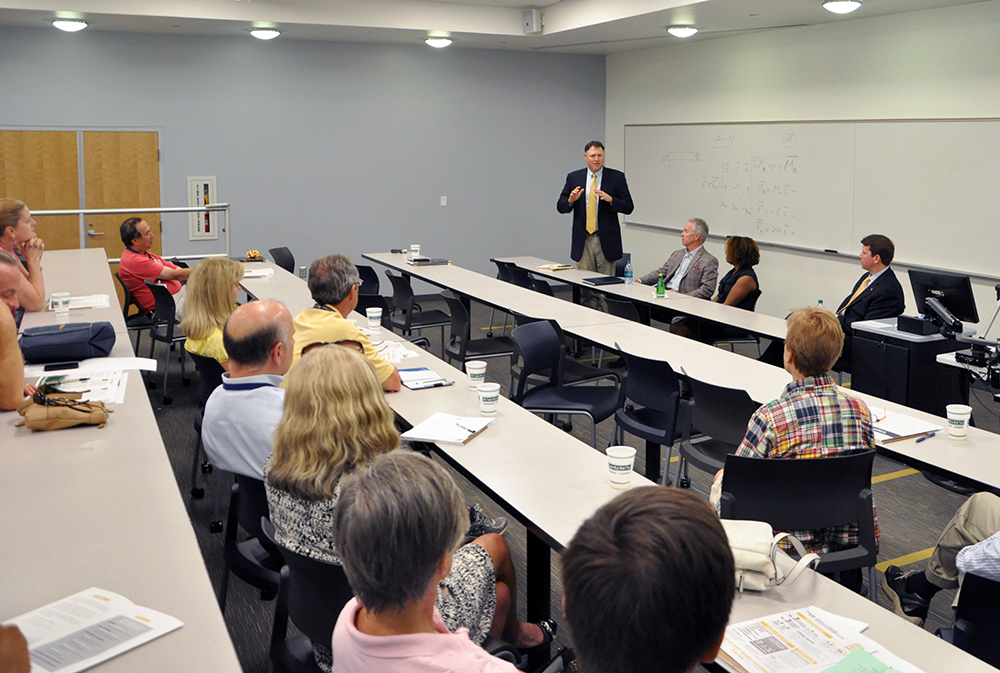A panel of four alumni attributed their successful careers to their Georgia Tech education when they spoke to the parents of current School of Civil and Environmental Engineering students Friday.
As part of Family Weekend events, Ryan Curry, B.S. 2001; Bill Higginbotham, B.S. 1976; Daveitta Jenkins, B.S. 1994; and Todd Long, M.S. 1990, shared their experiences with about two dozen family members and answered questions.
 |
| A panel of alumni talking about the career possibilities of a CEE degree. From left, Todd Long (standing), Bill Higginbotham, Daveitta Jenkins and Ryan Curry. (Photo by Joshua Stewart.) |
Among their advice for students:
Take the Fundamentals of Engineering Exam NOW.
“Definitely, definitely, if you student wants to go into professional practice, strongly encourage them to take it before they leave here,” said Susan Burns, the School’s associate chair for undergraduate studies. “Because the further they get away [from school], the harder it becomes.”
“I would interject — almost impossible,” Higginbotham said to laughs.
“The PE exam is simple in comparison. The [fundamentals] exam is very difficult,” he said.
Those who pass the fundamentals exam are considered engineers in training, meaning they’ll be able to sit for the Professional Engineer (PE) license exam after four years working under a licensed engineer (three if they have a master’s degree).
“Most employers give a couple thousand dollars extra if you have your EIT coming out of school,” Long said. Plus, the sooner you complete your four years of training, the sooner you can get licensed and get another bump in pay, he said.
“You want to get your four-year clock running. Get it done so when you first start your employment, that first day counts for your four years. For us, it’s almost a $10,000 raise [once engineers get their professional license],” Long said.
Another consideration:
“It becomes more critical in the private sector if you want to become a project manager,” Jenkins said. “There are certain requirements when you pursue projects that we have to have certain licensed individuals working on the project.”
Get a master’s degree — but only if you know you’ll need it.
“Most of the people who I’ve interacted with over the years who have done a lot with their post-graduate education are those people who had a reason and a passion for staying in school,” Higginbotham said. “Somebody who became a professor’s lab rat just to hide out until the job market got better didn’t really get great value out of that extra education.”
“It really depends on what your career aspirations are,” Jenkins said.
“When we’re hiring someone in the private sector, very rarely within our company will [the job posting] say a master’s is required,” she said. “Even though it may not be something that is required, depending on what your career focus is, it may provide much more benefit.”
“All of my master’s was in transportation, it was really focused. I learned more in that last year of school than I learned in the four years prior concerning what my job would be,” Long said. “So I would give it a ‘must-have’ for what I’ve done in my career, but if you don’t know what you’re going to do in a career, I don’t know that it matters that much.”
Curry is finance manger of corporate real estate for The Coca-Cola Company after working for major construction firms earlier in his career. Higginbotham, who has four decades of environmental, energy and construction engineering experience, leads ET Environmental Corporation.
Jenkins is a civil engineer at CH2M HILL in the transportation business group; she began her career at the Georgia Department of Transportation. Long is currently the deputy commissioner of Georgia DOT, where he’s worked for two decades.
